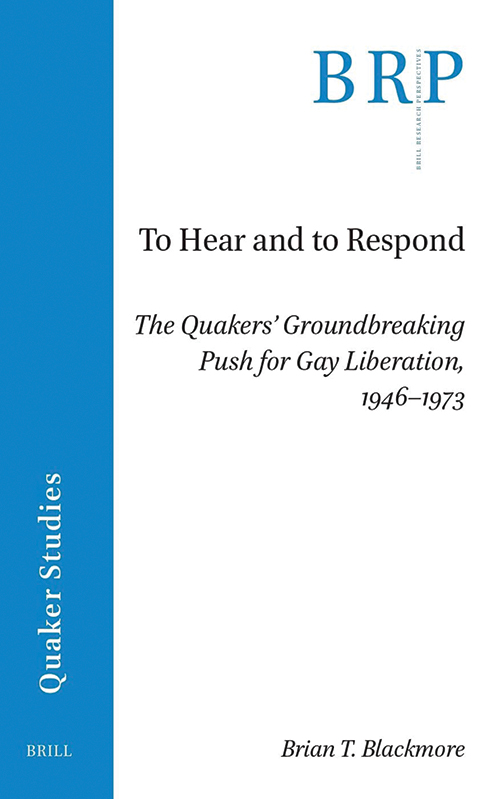
In Brief: To Hear and to Respond: The Quakers’ Groundbreaking Push for Gay Liberation, 1946–1973
Reviewed by Sharlee DiMenichi
October 1, 2025
By Brian T. Blackmore. Brill, 2025. 108 pages. $84/paperback or eBook.
Blackmore, an independent scholar and Friend living in Philadelphia, Pa., contributes to documenting LGBTQ history in the United States by discussing the crucial role Quakers played in promoting gay rights. The slim volume presents Quaker advocacy for gay people in the larger social and cultural context of the time period considered.
During the World War II era, Josiah P. Marvel, a Friend and Earlham College graduate, chaired the Quaker Emergency Service and created the Civilian Readjustment Committee, which sought to address the psychological needs of soldiers returning from Europe. For decades, men who had sex with men faced arrest and incarceration in prisons or labor camps. Marvel sought to offer an alternative to criminalizing gay sex.
The book offers details about Bayard Rustin, a gay, Black Quaker leader in the African American Civil Rights Movement who lost his job at the Fellowship of Reconciliation (FOR) due to his sexual relationships with men. Blackmore includes an excerpt from a letter from A.J. Muste, Rustin’s supervisor at FOR, who considered Rustin’s romantic alliances superficial and detrimental to the peace movement.
Blackmore explains what Muste’s and others’ judgmental opinions show about U.S. Quakers’ views on homosexuality in the mid-twentieth century: “among liberal Quakers in the 1950s, the physical act of gay sex was not considered morally wrong or sinful, but rather it was understood as inherently inferior because it was (in their view) ephemeral, lacking substance, and susceptible to moral corruption.”
This book is an excellent addition to the shelves of Friends looking for insights into the evolution of Quaker beliefs about LGBTQIA+ rights.
Sharlee DiMenichi is staff writer for Friends Journal.
1 thought on “In Brief: To Hear and to Respond: The Quakers’ Groundbreaking Push for Gay Liberation, 1946–1973”
Leave a Reply
Comments on Friendsjournal.org may be used in the Forum of the print magazine and may be edited for length and clarity.




Good to read this. I applaud the more relaxed thinking regarding gay men, but I wonder if they even considered that for maybe a majority of gay men, that romantic and physical expression of love was inborn, and the only possible channel for expressing physical and emotional love for another of their own gender.